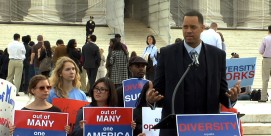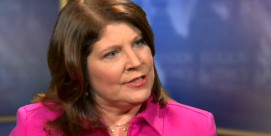In This Episode << SLIDE LEFT TO SEE ADDITIONAL SEGMENTS
Snyder v. Phelps
BOB ABERNETHY, host: The US Supreme Court opened its new term this week, and on Wednesday (October 6) dueling protests took place on the court steps as oral arguments began in a closely watched First Amendment case. The dispute centers on the highly controversial Westboro Baptist Church in Kansas, a small religious group that travels around the country protesting at military funerals. Members carry signs that millions find repulsive. They preach that America is being punished for its toleration of homosexuality. In 2006, Albert Snyder, the father of a Marine killed in Iraq, sued Westboro, claiming the church violated his privacy and inflicted emotional distress on his family by demonstrating near his son’s funeral. At the court on Wednesday, Synder called Westboro’s actions intolerable:
Albert Snyder: “All we wanted to do was bury Matt with dignity and respect.”
But Margie Phelps, counsel for Westboro and daughter of the church’s founder, Fred Phelps, argued that restricting their protests would have serious ramifications for free speech:
Margie Phelps: “There’s no line that can be drawn here without shutting down a lot of speech.”
We talk now about the major issues in the case with Kim Lawton, managing editor of this program, and Tim O’Brien, who covers the Supreme Court. Tim, the most despicable speech imaginable: no limits on it?
TIM O’BRIEN, correspondent: Well, there are limits on free speech. There can be time, place, and manner restrictions. You can’t go through someone’s neighborhood at four o’clock in the morning with a loud speaker. This is a content-based restriction, and that’s different. Even content–based restrictions are sometimes allowed. For example, you can sue somebody if they defame you. Obscenity is not protected by free speech. Fighting words are not protected. But here the words, the comments, the demonstration, as despicable as it was, might still be protected.
ABERNETHY: No matter how upset or sick it might make somebody else?
O’BRIEN: Consider this is an important issue. The rights of gay people, gays in the military—it’s a discussion. We might not like the way people come to this discussion or what they have to say about it. It’s still a legitimate discussion about an important public issue. Courts are loath to interfere with that kind of conversation.
KIM LAWTON, managing editor: And it’s always the question, too, of who draws the lines and on what basis do they draw the lines? And so what might be offensive to some people may not be offensive to others, and so it’s a very tricky thing for the courts to get into.
ABERNETHY: And Kim, there’s a religious angle to it too, isn’t there?
LAWTON: Well, this speech is religiously motivated, and this is a small church in Kansas—less than seventy members. Most of the people who go there are all from the same family. It’s an independent Baptist church, so it’s not affiliated with any other denomination or other movement, and in fact the Southern Baptist Convention, which is the largest Protestant denomination in the country, has taken great pains to say they are not related to us. The Southern Baptists also preach that homosexuality is a sin, but they say it’s a forgivable sin. So this Westboro church says God is punishing America for being tolerant of homosexuality. They’ve also picketed the Southern Baptists for being too liberal on the issue.
O’BRIEN: I don’t think the courts going to really care very much that it happens to be religious-inspired speech or how offensive it is. I think that what they are going to look at is what about this family’s privacy interests, what about the harm that it does to them emotionally to have this kind of a demonstration at this terrible time in their lives, and balance, try to balance those competing interests.
ABERNETHY: What about in a time when there’s, you know, the television and Internet and all kinds of ways that speech can be spread around the world. What—does that make any difference, should that make any difference in the content of what’s said?
O’BRIEN: Well, the Supreme Court has addressed that question as well. It says television, for example, and radio—they are entitled to the least First Amendment protection because it’s so uniquely accessible to children in the privacy of the home. The Internet, newspapers, demonstrations on the street, however—they’re entirely different, and the Court has accorded them the greatest protection.
ABERNETHY: And what about the feelings of people about, for instance, an Islamic center right near Ground Zero?
O’BRIEN: Bob, I think that is very similar to what we have here. We have something that many of us find offensive, and it may in fact be in bad taste. Perhaps it shouldn’t be there, but to say it may not be allowed there is an entirely different matter. We might not like it, but our Constitution protects it.
LAWTON: Well, and just to get back to the religion point, though, while this case is not directly about those issues, a lot of religious groups have found themselves in this case before the Supreme Court in an uncomfortable spot, because on the one hand they don’t want to be associated with the message of this group, and religious speech doesn’t get a special place in law so, yes, they haven’t spoken on it. But they are concerned. The notion of somebody restricting a religiously motivated speech makes them uncomfortable privately even though they don’t want to necessarily say that, and that’s not what may happen in this case, but it’s sort of out there—religious people worrying about what we can say in the public forum and what we can’t, and so that is one of the things they’ll be watching.
ABERNETHY: And does it bleed over into what might be said in a pulpit?
LAWTON: Well, obviously there’s some concern about that as well, although that’s certainly not what’s at stake here, and I think the courts have always given special protection, you know, to religious practice. But there is some worry about, you know, again, free speech when it comes religion on these tough issues.
ABERNETHY: And Tim?
O’BRIEN: As offensive as you find this conduct, the fact that it happened may make us all cringe, but that it’s allowed to happen is another matter. When you are in a country that doesn’t have anything like this, where everyone behaves, where discourse is always civil, where the press is always responsible—well, that might be the scariest scenario of all. You’ve left a democracy and entered a place that’s much less.
ABERNETHY: Tim O’Brien, Kim Lawton, many thanks.







